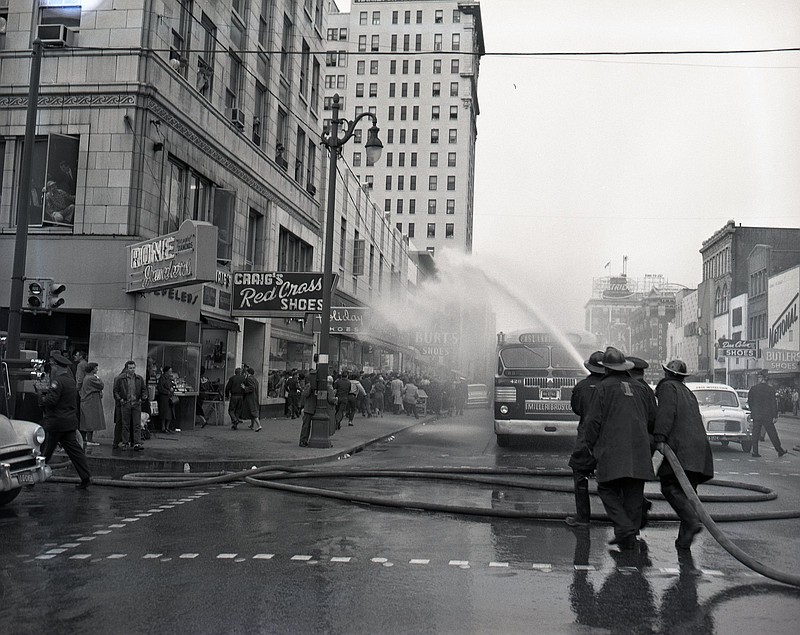This 1960 photograph of a fire hose being aimed at a downtown crowd is one of the iconic scenes of the civil rights era in Chattanooga.
Then-Chattanooga Mayor P.R. "Rudy" Olgiati ordered the crowd to be doused on Wednesday, Feb. 24, 1960, after several days of increasingly tense demonstrations at segregated lunch counters at downtown stores, according to news reports from the time.
An Associated Press reporter on the scene noted: "Olgiati stood in the middle of the street and watched the demonstration for about two hours before ordering the hose turned on the crowd."
Some have seen parallels between these events 60 years ago and recent Chattanooga protests to promote social justice and policing reform tied to the Black Lives Matter movement and the death of George Floyd in Minneapolis police custody on May 25.
This photograph is part of an archive of old Chattanooga Free Press images curated by local history buff Sam Hall at ChattanoogaHistory.com, a website that preserves and shares legacy photographs of the city.
It shows black and white citizens outside the F.W. Woolworth Co. store near the corner of 8th and Market streets as they are being soaked by firefighters.
According to the AP: "A tense, milling crowd" of several thousand white and black people was scattered with fire hoses. The report also noted that police made 20 arrests that day, and that eight of those arrested were juveniles.
At the time, lunch counters in F.W. Woolworth Co. and other downtown variety stores refused to serve black customers alongside whites. Other stores involved in the Chattanooga "sit-ins" were McLellan Co., W.T. Grant Co. and S.H. Kress & Co.
A group of students from predominantly black Howard High School began the series of peaceful demonstrations on Friday, Feb. 19, 1960, to protest the policy of racial segregation in public and private facilities.
"The parents told you back then, don't you get involved in things like that," Robert Parks, one of the former Howard High students who is now in his late 70s, told Times Free Press reporter Wyatt Massey earlier this year for a retrospective article about the 1960 sit-ins. "But we wanted to see a change. And I had thought it might be bad, but you got to make a change somewhere."
(READ MORE: Police brutality protests in Chattanooga today echo demonstrations of years past)
More Info
Launched by history enthusiast Sam Hall in 2014, ChattanoogaHistory.com is maintained to present historical images in the highest resolution available.If you have photo negatives, glass plate negatives, or original non‐digital prints taken in the Chattanooga area, contact Sam Hall for information on how they may qualify to be digitized and preserved at no charge.
Free Press editorial page editor Clint Cooper has noted that news reports from 1960 said the black students "read, talked and ate potato chips, peanuts and lunches brought with them" to the lunch counters, but were not served. Tensions heightened with the presence of white youths who also attempted to occupy the lunch counters, but the appearance of police in the stores [initially] prevented any skirmishes."
However, physical altercations eventually did break out. The AP reported that on Feb. 23, 1960, the demonstrations deteriorated into "a wild slugfest" between black and white youths.
Local news reports noted that Chattanooga thus became "the first major southern city since 1954 to resort to [a] fire hose to clear its main business district." Similar sit-ins were being staged at about the same time in Nashville and Greensboro, North Carolina.
The demonstrations continued sporadically for several months, and the push eventually led to the negotiated integration of store lunch counters here in August 1960. Three years later all public facilities in Chattanooga were integrated, according to news reports.
Follow the "Remember When, Chattanooga" public group on Facebook.
Contact Mark Kennedy at mkennedy@timesfreepress.com.
